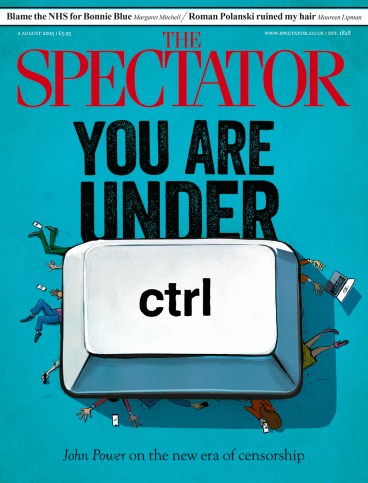
At Stansted on Monday, a currency kiosk offered me €270 for £300. ‘Wrong way round,’ I said, having swiftly figured €300 for £270 would represent an exchange rate of 1.11, close enough to the current market level of 1.14. ‘Nah, mate, airport rate, innit?’
This week’s first lesson is never buy euros at the airport; but the second lesson is that wherever you buy them – especially if you have, say, a Mediterranean superyacht charter in prospect – you’re in for a painfully expensive summer. Back in March you could have had €1.20 for your pound. Since then sentiment towards sterling has been soured by expectations of bad economic news made worse by whatever Rachel Reeves does next, necessitating successive interest rate cuts.
The EU would have to perform worse than the UK to reverse the mood – but Ursula von der Leyen’s Turnberry trade deal with Donald Trump, even with 15 per cent tariffs, makes that less likely. And according to analysts at HSBC, the euro that had such a rocky start at the turn of the century has emerged in volatile markets as a ‘robust safe haven’ for global investors, second only to gold and on a par with the Swiss franc.
‘We’re looking at a range of 1.16 to 1.12 over the next year,’ a veteran trader tells me. ‘I’m sorry to say there’s little likelihood of 1.20.’ Time to book a smaller yacht.
The judges’ message
Everyone in the money markets knew that the 14-year sentence passed on the former UBS and Citigroup trader Tom Hayes (later reduced to 11 years, of which he served five and a half) at Southwark Crown Court in 2015 for his role in the Libor rate-fixing scandal was, to say the least, disproportionate. I’d go so far as to guess that the entire City felt queasy about it, as did readers of David Enrich’s investigative account of the case, The Spider Network (2017). So no surprise that the Supreme Court has belatedly quashed Hayes’s convictions for conspiracy to defraud and that the handful of remaining Libor-related guilty verdicts are now likely to be overturned.
Confusingly, the Supreme Court justices did not fully exonorate Hayes: they found ‘ample evidence’ that he might fairly have been convicted for the way he pushed for Libor submissions (the data by which official interbank rates were fixed) that favoured his trading book. But they also found that the Southwark judge, Sir Jeremy Cooke, had misdirected the jury as to what the law would deem a dishonest submission, in a way that rendered Hayes’s convictions unsafe.
Cooke himself described the original sentence, one of the longest ever handed down for a white-collar crime in Britain, as ‘a message sent to the world of banking’. But the final message received is that the lower courts and the Serious Fraud Office – which will not seek a retrial – were incompetent to deal with a scandal for which blame should properly have been shared between a multiplicity of market participants and their bosses, all of whom would have pleaded that they were merely following market practice within loose regulatory guidelines.
Meanwhile, justice in the alternative form of fines on banks and money-broking firms involved will have done little or nothing to stop them gaming market rules again when circumstances make it expedient. No clarity, scant deterrent, no consistency with US courts that abandoned prosecutions for the same behaviour, and ultimately no reassurance that wrongdoing, if such there was, has been brought to book. British justice should be as embarrassed by the Libor scandal as the financial community itself.
Selling out
‘When money talks, you’re under its spell,’ wrote the great musical satirist turned maths professor Tom Lehrer (who has died aged 97) in his 1973 song ‘Selling Out’. ‘But what do you have when there’s nothing left to sell?’ Far from his funniest line but one which perhaps illuminates his decision in 2022 to place all his compositions and recordings in the public domain. Allowing teachers and performers to use his work free of copyright was the act of an academic long retired from the cabaret stage who presumably didn’t need the royalties: but for as long as the dark sentiments of ‘Poisoning Pigeons in the Park’ and ‘I Hold Your Hand In Mine’ – the severed hand of a murdered lover, that is – are enjoyed, other artists struggling to protect their creations against online piracy and plagiarism will curse the high-minded Lehrer precedent.
Mission impossible
Good to see ‘Red Len’ McCluskey, the former general secretary of the Unite union, back in the news. A lawyer’s report commissioned by his successor Sharon Graham found that he had signed a contract without a competitive tender for a construction firm called Flanagan, whom he called ‘good friends’, to build a Birmingham hotel and conference centre for the union; first estimated at £7 million, the project eventually cost £125 million – of which £96 million went to Flanagan, which also allegedly provided McCluskey with private jet flights and football tickets, though he denies any improper dealings.
All of which plays to my theory about this supposed firebrand of the Corbynist left. Ever since he fuelled a hugely disruptive British Airways cabin crew strike just before the 2010 general election and declared the 2012 London Olympics a legitimate target for protests against cuts in public sector jobs, I’ve suspected McCluskey of being a Manchurian candidate for the Conservative party, programmed to damage Labour interests every time he grabs a headline.
As Unite and its ilk exercise resurgent power, up he pops from retirement to remind us of yesterday’s union barons, whose pomp and folly did so much to discredit their movement. There’s a film script in this somewhere, but sadly today’s Tories are so diminished not even secret agent McCluskey can save them.








Comments